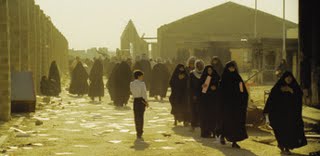 Back to selection
Back to selection
“SON OF BABYLON” | writer-director, Mohamed Al Daradji
[PREMIERE SCREENING: Monday, Jan. 25, 6:00 pm — Egyptian Theatre, Park City]
The hardest decision I made on my film was with the casting. My style of working and telling the story often means working with non-professional actors. The main character of the film is a mother who goes across Iraq with her grandson, searching for her son who has been missing for 12 years. My aim was to search for people who had this experience; I searched for six months in villages and cities in Iraq. Eventually I came to a small village of about 300 homes, and each home had a story about missing people from their families. Knocking on doors and hearing the mothers’ stories of their missing husbands, fathers and sons was heartbreaking; after awhile I knocked on a door and found my main character.
Looking into her eyes I saw that she could be the woman I was looking for; I discovered she had been put in prison twice for political reasons, over five years in total and whilst in prison she lost a child. She also lost her husband who she was never able to find; he had been taken to a prison when she was in prison herself and she never saw him again. For 20 years of her life she searched for him and had the same experience as my main character.
I felt she would be the right woman to tell this story with me, but it was very difficult as it was so emotional for her and for us, that maybe I would lose my direction in the emotion of the situation with this woman. Working with this woman during filmmaking, I learned more about her story: Her brother was hung in the street and buried in an unknown place. This woman dedicated a year of her life to find her brother and give him a proper burial; she recovered his body and smuggled it away from the unmarked grave herself, to let him rest in peace.
Locked somewhere between her character and her memories for eight hours, her character searches for her missing son but as she plays this role she begins to relive her own experiences. Going through this experience with her we were all helpless to ease her pain and felt it all ourselves. I had to wonder in this moment if I had made the right decision to work with this woman because now we were causing her to relive her pain and suffering. And this was affecting all of us as we began to recognize the pain of own mothers, aunts and sisters. I began to think I was inhuman for putting everyone through this. Perhaps the reality of the situation is too real and too present to tell honestly at this time.
We took two days break after this scene before we went back to work. As filming concluded I had the chance to learn more about this woman. She had been a witness against Saddam during his trial, but she said to me, “Mohamed, even with all my experiences I don’t want revenge, not anymore. If you can find it in yourself to forgive we should. This is how Iraq will move on.”
In the edit when we saw her performance, I thought about my doubts, and I realized she had given us such a genuine and moving performance. Only someone with that experience and humanity could provide that, and I felt it was the right decision, even though a hard one.

